Christmas Oratorio, AAM, Egarr, Barbican | reviews, news & interviews
Christmas Oratorio, AAM, Egarr, Barbican
Christmas Oratorio, AAM, Egarr, Barbican
Only one vocal star shines over Bach's Bethlehem, but it's good to hear all six cantatas

Relatively recent tweaks to the abundant London concert scene have resulted in top-end events right up to Christmas. We have in part to thank the seasonal festival at St John’s Smith Square, postponing the Orchestra of the Age of Enlightenment’s holidays, putting them together with superb soloists and choirs, and serving up major Handel and Bach. One snag: their Christmas Oratorio when I last went to hear it turned out to be only four cantatas out of the sequence of six.
 You’d have to pay two period-instrument horn players if you included Part Four – the OAE didn’t – and yet as Richard Egarr’s absolutely complete performance with the Academy of Ancient Music last night proved, the dark velvet sound of those horns, superbly played by Gavin Edwards and David Bentley (pictured left), along with the Oratorio’s most introspective magic made this the very heart and soul of the work. Not as far as the plot of the Christmas story goes; all that happens is the naming of Jesus at his circumcision, but this kicks off the loveliest recits, the bass meditating on that “sweet word” with soprano-led chorales punctuating and haloing his thoughts. The real star of the evening was young Ashley Riches, only two years out of the Royal Opera’s Jette Parker Young Artists programme, and the total artist: range secure from top to bottom, a highly dramatic way with the text and pure musicianship.
You’d have to pay two period-instrument horn players if you included Part Four – the OAE didn’t – and yet as Richard Egarr’s absolutely complete performance with the Academy of Ancient Music last night proved, the dark velvet sound of those horns, superbly played by Gavin Edwards and David Bentley (pictured left), along with the Oratorio’s most introspective magic made this the very heart and soul of the work. Not as far as the plot of the Christmas story goes; all that happens is the naming of Jesus at his circumcision, but this kicks off the loveliest recits, the bass meditating on that “sweet word” with soprano-led chorales punctuating and haloing his thoughts. The real star of the evening was young Ashley Riches, only two years out of the Royal Opera’s Jette Parker Young Artists programme, and the total artist: range secure from top to bottom, a highly dramatic way with the text and pure musicianship.
Tenor James Gilchrist has those last two qualities in abundance, but the lyric-tenor flow doesn’t come so easily to him these days. The aria “Ich will nur dir zu Ehren Leben” ("I will love only for Your honour") was a miracle of elegant runs, the rest patchier. As was the case with soprano Lorna Anderson, a late replacement for indisposed Susan Gritton, and mezzo Barbara Kozelj; uneven vocal production left us with some quiet stretches. But Anderson hit an expressive purple patch in tandem with oboist Frank de Bruine in the “Echo” aria adapted, like so much else in the sequence, from one of three earlier cantatas in praise of local potentates.
 Too much is often made of the “parody” techniques whereby Bach reworked previous music into a different context. More importantly, the oratorio sequence is one of careful contrasts and a cornucopia of fascinating, highly varied instrumentation, from the drums and trumpets – the risk of capricious valveless instruments just about worth taking for the sheer beauty of tone – of the opening chorus through to the oboes da caccia (Mark Radcliffe and Oonagh Lee, pictured right) making up a pastoral group of four for the shepherds’ pastorals and a vigorous trio of solo strings. Cello and bass lines frequently rocked the Barbican, not the ideal setting for this work but more amenable to these small forces than to large symphony orchestras.
Too much is often made of the “parody” techniques whereby Bach reworked previous music into a different context. More importantly, the oratorio sequence is one of careful contrasts and a cornucopia of fascinating, highly varied instrumentation, from the drums and trumpets – the risk of capricious valveless instruments just about worth taking for the sheer beauty of tone – of the opening chorus through to the oboes da caccia (Mark Radcliffe and Oonagh Lee, pictured right) making up a pastoral group of four for the shepherds’ pastorals and a vigorous trio of solo strings. Cello and bass lines frequently rocked the Barbican, not the ideal setting for this work but more amenable to these small forces than to large symphony orchestras.
From the start, Egarr produced a crisp and even sound from his orchestra and chorus, always word-sensitive even if brighter sopranos would have reinforced the sheer jubilation of the first, third and sixth cantatas. So yes, well worth the shortcomings to celebrate the unflagging genius and spirit of the season’s greatest musical offering.
- The Academy of Ancient Music perform more cantatas by Bach in March 2016
rating
Share this article
The future of Arts Journalism
You can stop theartsdesk.com closing!
We urgently need financing to survive. Our fundraising drive has thus far raised £49,000 but we need to reach £100,000 or we will be forced to close. Please contribute here: https://gofund.me/c3f6033d
And if you can forward this information to anyone who might assist, we’d be grateful.

Subscribe to theartsdesk.com
Thank you for continuing to read our work on theartsdesk.com. For unlimited access to every article in its entirety, including our archive of more than 15,000 pieces, we're asking for £5 per month or £40 per year. We feel it's a very good deal, and hope you do too.
To take a subscription now simply click here.
And if you're looking for that extra gift for a friend or family member, why not treat them to a theartsdesk.com gift subscription?
more Classical music
 Hallé John Adams festival, Bridgewater Hall / RNCM, Manchester review - standing ovations for today's music
From 1980 to 2025 with the West Coast’s pied piper and his eager following
Hallé John Adams festival, Bridgewater Hall / RNCM, Manchester review - standing ovations for today's music
From 1980 to 2025 with the West Coast’s pied piper and his eager following
 Kaploukhii, Greenwich Chamber Orchestra, Cutts, St James's Piccadilly review - promising young pianist
A robust and assertive Beethoven concerto suggests a player to follow
Kaploukhii, Greenwich Chamber Orchestra, Cutts, St James's Piccadilly review - promising young pianist
A robust and assertive Beethoven concerto suggests a player to follow
 Robin Holloway: Music's Odyssey review - lessons in composition
Broad and idiosyncratic survey of classical music is insightful but slightly indigestible
Robin Holloway: Music's Odyssey review - lessons in composition
Broad and idiosyncratic survey of classical music is insightful but slightly indigestible
 Classical CDs: Wolf-pelts, clowns and social realism
British ballet scores, 19th century cello works and contemporary piano etudes
Classical CDs: Wolf-pelts, clowns and social realism
British ballet scores, 19th century cello works and contemporary piano etudes
 Bizet in 150th anniversary year: rich and rare French offerings from Palazzetto Bru Zane
Specialists in French romantic music unveil a treasure trove both live and on disc
Bizet in 150th anniversary year: rich and rare French offerings from Palazzetto Bru Zane
Specialists in French romantic music unveil a treasure trove both live and on disc
 Scottish Chamber Orchestra, Ibragimova, Queen’s Hall, Edinburgh review - rarities, novelties and drumrolls
A pity the SCO didn't pick a better showcase for a shining guest artist
Scottish Chamber Orchestra, Ibragimova, Queen’s Hall, Edinburgh review - rarities, novelties and drumrolls
A pity the SCO didn't pick a better showcase for a shining guest artist
 Kilsby, Parkes, Sinfonia of London, Wilson, Barbican review - string things zing and sing in expert hands
British masterpieces for strings plus other-worldly tenor and horn - and a muscular rarity
Kilsby, Parkes, Sinfonia of London, Wilson, Barbican review - string things zing and sing in expert hands
British masterpieces for strings plus other-worldly tenor and horn - and a muscular rarity
 From Historical to Hip-Hop, Classically Black Music Festival, Kings Place review - a cluster of impressive stars for the future
From quasi-Mozartian elegance to the gritty humour of a kitchen inspection
From Historical to Hip-Hop, Classically Black Music Festival, Kings Place review - a cluster of impressive stars for the future
From quasi-Mozartian elegance to the gritty humour of a kitchen inspection
 Shibe, LSO, Adès, Barbican review - gaudy and glorious new music alongside serene Sibelius
Adès’s passion makes persuasive case for the music he loves, both new and old
Shibe, LSO, Adès, Barbican review - gaudy and glorious new music alongside serene Sibelius
Adès’s passion makes persuasive case for the music he loves, both new and old
 Anja Mittermüller, Richard Fu, Wigmore Hall review - a glorious hall debut
The Austrian mezzo shines - at the age of 22
Anja Mittermüller, Richard Fu, Wigmore Hall review - a glorious hall debut
The Austrian mezzo shines - at the age of 22
 First Person: clarinettist Oliver Pashley on the new horizons of The Hermes Experiment's latest album
Compositions by members of this unusual quartet feature for the first time
First Person: clarinettist Oliver Pashley on the new horizons of The Hermes Experiment's latest album
Compositions by members of this unusual quartet feature for the first time

Add comment